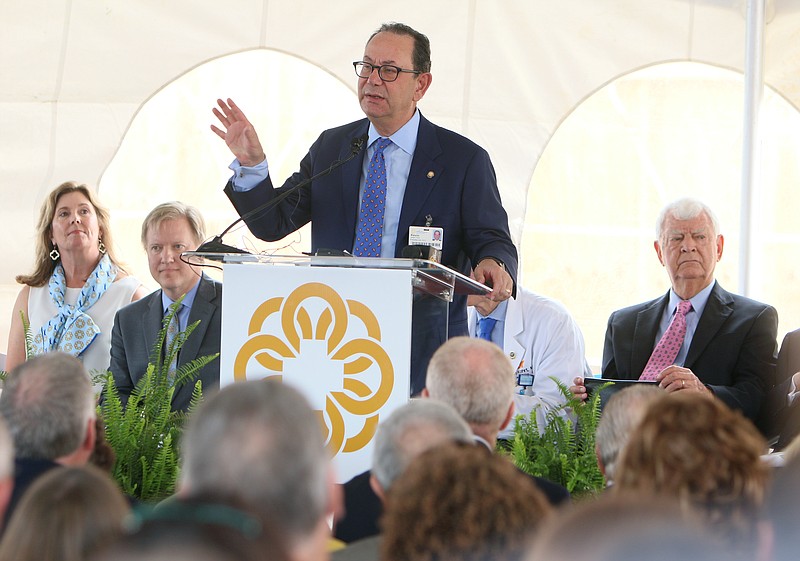The public picture was sparkling - a whiz-bang, new children's outpatient center, a growing reach of regional health affiliates and finances that appear to be more black than red.
But something has been amiss at Erlanger Health System, something serious enough that caused a mutual separation of President and CEO Kevin Spiegel from the hospital - after more than six years - Wednesday.
We don't know the whole scope of the problems that brought about the action. We're not sure the board and management of the health system could know everything that culminated in yesterday's resignation.
Internally, though, things have not functioned as smoothly as they should at what has become the nation's 10th largest public hospital system.
For us, the most egregious of the problems - and perhaps the most public - was the revelation of a letter sent in May from the hospital's Medical Executive Committee to board Chairman Mike Griffin, and later obtained by the Times Free Press.
Frighteningly, the committee - a group of top physicians who oversee the quality and safety of medical care at Erlanger - said it voted "no confidence in the structure of the current Executive Leadership to ensure quality and safety of patient care."
"Despite over 3 years of complaints and concerns by patients and physicians," the letter stated, "hospital management has been ineffective in addressing these issues. There exists a lack of accountability in senior management who are either unable or unwilling to effect necessary changes to insure patient safety."
Patient safety is the last thing, the very last thing, someone who enters a hospital should have to worry about. One enters a hospital, after all, to get better. If one has to worry about patient safety in a hospital, that someone has come to the wrong place.
And for some, as Herculean as the efforts had been by Spiegel and others to turn around the hospital financially, as farsighted as some of his actions seemed in acquiring regional facilities and as brilliant as his vision was for a medical corridor along Third Street, concerns about patient safety were overriding.
The May letter detailed problems with chronic operational issues, including inefficiency, understaffing, poor morale and policies that caused overcrowding in the main campus emergency department and operating rooms.
And in the past, under the CEO, there had been contract disputes with cardiology, radiology and neonatology physician groups, as well as with the attendant University of Tennessee College of Medicine.
A big-footed lawsuit to wring $15 million out of Catoosa and Walker counties when a management deal for Erlanger to take over the former Hutcheson Medical Center fell through in 2013 left bad blood about Erlanger in North Georgia, and the doling out of hundreds of thousands of dollars in bonuses only months after the hospital pleaded it had but weeks of cash reserves left in 2014 was tone-deaf.
Individual employees, from administrators to hourly workers, could probably elucidate where and when they saw things fall off the tracks.
Unfortunately, the perfect president and CEO doesn't exist. Where one is strong with employees, he or she is unpopular with management. Where one fosters an excellent working relationship with doctors, hourly employees find him or her stiff and uncaring.
Now, Erlanger will have to find its next leader, its sixth in just over 20 years.
And before it does that, hospital trustees will need to work out whether to pay Spiegel any severance and, if so, how much. The CEO's employment agreement, barring violations, indicates his severance could be as much as 24 months of salary or $1.93 million. The most in severance the hospital previously paid was $728,000 to Jim Brexler, who left the hospital in 2011. Spiegel's base pay - after the board gave him a $46,000 raise less than a year ago - was $964,000.
If a patient were to enter Erlanger hospital today, that patient undoubtedly would receive the top care available from doctors, nurses and other staff. As professionals, they want to do their best work and desire only successful patient outcomes. The patient likely would leave the hospital wondering if the concerns about quality and safety have been overblown.
But all that glitters is not gold, and that will be the challenge both for the board in trying to get to the bottom of how internal problems developed and festered as they did and how a new hospital leader might be able to alleviate those problems and move the hospital forward.
